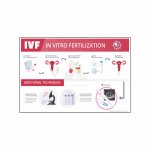Ananya and Rahul had everything — great careers, a dream apartment in the heart of the city, weekend getaways, and big dreams. But when they decided to start a family, reality hit them like a storm. After two years of failed attempts, endless medical tests, and silent tears behind closed doors, they were told they were among the growing number of urban couples facing unexplained infertility.
Urbanization has gifted us modern lives — faster internet, smarter homes, and convenience at every step. But in the middle of all this progress, something primal is silently slipping away — our ability to reproduce naturally.
According to WHO, infertility now affects 1 in every 6 couples globally. And it’s not just a medical issue — it’s an emotional, social, and psychological battle. Alarmingly, urban infertility rates are rising faster than ever, especially among people in their late 20's and early 30's — the very age group once considered biologically optimal for starting a family.
So what’s causing this?
The fast-paced urban lifestyle brings chronic stress, poor sleep, pollution, sedentary routines, fast food addictions, and exposure to harmful chemicals. Long office hours and screen-filled evenings leave little room for natural rhythms and healthy habits. Women face hormonal imbalances due to disrupted circadian cycles, while men show declining sperm quality from stress, alcohol, and electromagnetic radiation. Infertility is no longer just a women’s issue — it's affecting all genders equally.
Moreover, environmental toxins like microplastics, pesticides in urban produce, and poor air quality are silently attacking our reproductive health. Even the “hustle culture” glamorized on social media contributes to delaying marriage and childbirth — often until fertility begins to decline.
But behind statistics are stories. There are couples silently breaking inside fertility clinics. There are young women injecting hormones daily. There are men struggling with shame and silence. And there are thousands facing isolation in a society that still treats childlessness as taboo.
We need awareness, not whispers. Regular reproductive health check-ups should be normalized. Conversations around infertility must be de-stigmatized. Urban planning must prioritize not just development, but well-being — green spaces, mental health care, pollution control, and access to affordable fertility treatments.
It’s time we ask — is modern life truly sustainable, if it takes away our ability to bring life?
Let’s change the conversation from “settle down later” to “listen to your body now.” Fertility is not just a choice — it's also a window that closes faster in cities where we rarely pause.
Urbanization has gifted us modern lives — faster internet, smarter homes, and convenience at every step. But in the middle of all this progress, something primal is silently slipping away — our ability to reproduce naturally.
According to WHO, infertility now affects 1 in every 6 couples globally. And it’s not just a medical issue — it’s an emotional, social, and psychological battle. Alarmingly, urban infertility rates are rising faster than ever, especially among people in their late 20's and early 30's — the very age group once considered biologically optimal for starting a family.
So what’s causing this?
The fast-paced urban lifestyle brings chronic stress, poor sleep, pollution, sedentary routines, fast food addictions, and exposure to harmful chemicals. Long office hours and screen-filled evenings leave little room for natural rhythms and healthy habits. Women face hormonal imbalances due to disrupted circadian cycles, while men show declining sperm quality from stress, alcohol, and electromagnetic radiation. Infertility is no longer just a women’s issue — it's affecting all genders equally.
Moreover, environmental toxins like microplastics, pesticides in urban produce, and poor air quality are silently attacking our reproductive health. Even the “hustle culture” glamorized on social media contributes to delaying marriage and childbirth — often until fertility begins to decline.
But behind statistics are stories. There are couples silently breaking inside fertility clinics. There are young women injecting hormones daily. There are men struggling with shame and silence. And there are thousands facing isolation in a society that still treats childlessness as taboo.
We need awareness, not whispers. Regular reproductive health check-ups should be normalized. Conversations around infertility must be de-stigmatized. Urban planning must prioritize not just development, but well-being — green spaces, mental health care, pollution control, and access to affordable fertility treatments.
It’s time we ask — is modern life truly sustainable, if it takes away our ability to bring life?
Let’s change the conversation from “settle down later” to “listen to your body now.” Fertility is not just a choice — it's also a window that closes faster in cities where we rarely pause.

